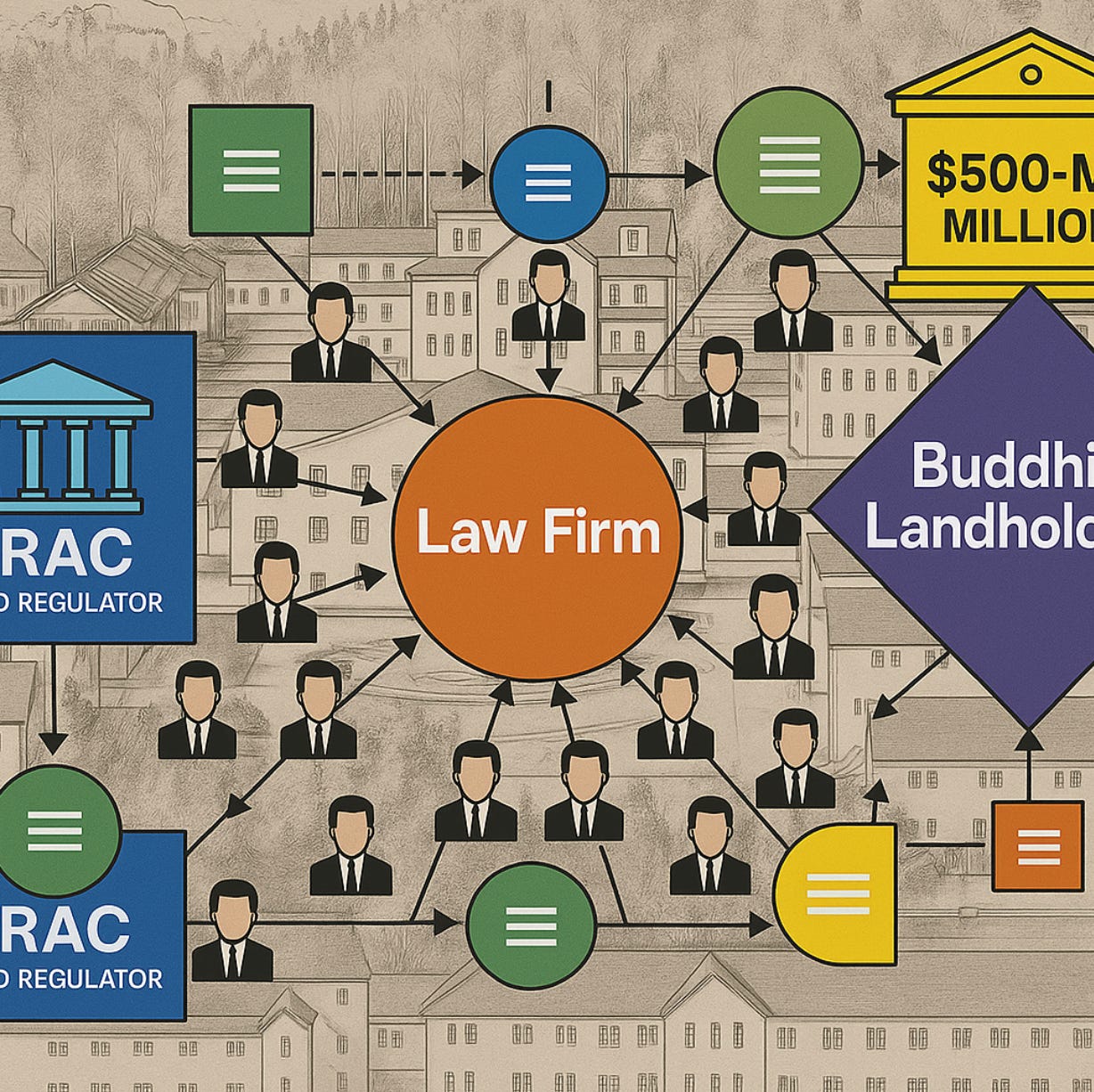Exclusive: Canadian Law Firm That Represented Buddhist Landholders Became a Pipeline of Lawyers Into Regulator That Investigated Them
Raises sharp questions of regulatory capture in $500-million foreign-ownership and influence investigation rocking P.E.I.
By Garry Clement and Sam Cooper
OTTAWA — When the Island Regulatory and Appeals Commission opened an investigation into Buddhist landholdings between 2016 and 2018, few could have imagined that, nearly a decade later, its quietly shelved probe would raise serious questions about whether the regulator itself had become entangled in the very network of interests it was meant to police.
What began as a legitimate inquiry into questionable real-estate transactions — including an alleged cash payment of property-tax arrears by the leader of a Buddhist society on behalf of ostensibly unrelated Taiwanese landowners — has since prompted broader scrutiny of a possible nexus between political patronage, elite influence, and foreign interests on Prince Edward Island.
The issue has inflamed citizens across Canada’s smallest province, where the scale of money and land involved is extraordinary — especially in a jurisdiction that has historically guarded against foreign ownership. Canadian tax filings indicate that roughly $500 million is in play, even as the Buddhist entities at the centre of the controversy advance plans to build a university-scale institution.
The regulator, known as IRAC, sought to determine how vast tracts of Island farmland came under the control of a network of interrelated Buddhist organizations whose leadership and financing trace back to Taiwan and the global movement known as Bliss & Wisdom. In reporting strongly denied by the Buddhist groups, CBC described how certain land buyers were linked to organizations with connections to Beijing’s foreign-influence apparatus.
CBC also reported that in 2023, a senior Bliss & Wisdom monk travelled between Taiwan, Prince Edward Island, and China to speak at a Beijing forum organized by the Buddhist Association of China — an entity overseen by the Chinese Communist Party’s United Front Work Department. The group had previously attended a 2014 government-hosted religious gathering in China, where remarks promoting cross-Strait “Buddhist unity” were later published on Bliss & Wisdom’s website.
Taiwanese officials in Canada have repeatedly warned that Beijing’s United Front networks make use of fronts to advance efforts aimed at undermining Taiwan’s sovereignty — a territory China continues to claim as a breakaway province.
The Buddhist organization and its representatives have consistently denied any formal connection to Beijing or any improper land dealings on Prince Edward Island.
Back to the regulator’s mandate: in 2016, IRAC’s probe aimed to assess the legality of these land transactions and determine whether foreign-linked entities had exceeded provincial ownership limits. Represented by prominent Island law firms, the Buddhist organizations mounted a formidable legal defence — one retained Cox & Palmer, another engaged Key Murray Law — while IRAC itself relied on Stewart McKelvey as counsel.
Despite the scope and significance of the case, the investigation was abruptly terminated in January 2018, and IRAC declined to release any report or findings. The lack of disclosure deprived the public of transparency and invited speculation: why would a statutory body charged with protecting the integrity of Island land ownership withhold the results of such a consequential inquiry?
An examination of public-record appointments reveals an interesting pattern. Lawyers who once worked for Cox & Palmer — the firm that represented the Buddhist groups at the centre of the probe — later took positions within IRAC, the very body that conducted that probe. Taken together, these findings raise a fair and unavoidable question: has there been a systematic embedding of Cox & Palmer alumni within the institutions responsible for land oversight and regulation on Prince Edward Island?
In the fall of 2018, then-Liberal Premier Wade MacLauchlan appointed Mary Lynne Kane, a long-time Cox & Palmer partner, as Deputy Minister of Communities, Land and Environment — a pivotal post overseeing land transactions and regulatory policy. Her appointment effectively placed the firm’s imprint at the centre of Prince Edward Island’s land-governance system.
After the 2019 election, Progressive Conservative Premier Dennis King dismissed Mary Lynne Kane but soon brought another Cox & Palmer veteran into his inner circle: Pam Williams, a 20-year partner at the firm, who became his Chief of Staff. Premier King later publicly defended the Buddhist organizations, remarking that “the monks are our friends.”
During the same period, IRAC drew heavily from the same professional network. Jessica Gillis, formerly with Cox & Palmer, was appointed IRAC’s General Counsel, while Charity Hogan, another alumna, became Director of Land and Chief Operating Officer in 2021.
The culmination of this influx came in early 2025, when Premier King — just before resigning — appointed his Chief of Staff, Pam Williams, as Chair, CEO, and Commissioner of IRAC.
Let’s pause for a moment to digest that.
A senior lawyer from the firm that represented the Buddhist entities under IRAC’s original review was hired by the Premier — who had publicly supported those same Buddhist groups — and was later appointed by him, on the eve of his departure, to lead the very regulator that once investigated them. But there’s more to it.
Keep reading with a 7-day free trial
Subscribe to The Bureau to keep reading this post and get 7 days of free access to the full post archives.


